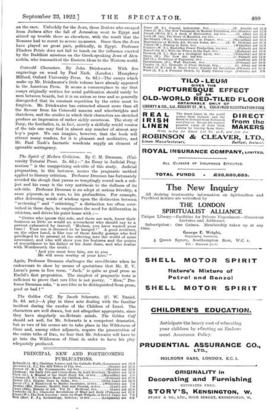The Spirit of Modern Criticism. By C. M. Drennan. (Uni-
versity Tutorial Press. 2s. 6d.)—" An Essay in Judicial Prag- matism" is the unappetizing sub-title of this study. Judicial pragmatism, in this instance, means the pragmatic method applied to literary criticism. Professor Drennan has fortunately avoided the slough that yawns so temptingly round such a sub- ject and his essay is the very antithesis to the dullness of its sub-title. Professor Drennan is an adept at serious frivolity, a sauce piquante, as it were, to his profundities. For example, after delivering words of wisdom upon the distinction between " reviewing " and "criticizing," a distinction too often over- looked in these days, he emphasizes the need for deliberation in criticism, and drives his point home with :—
"Critics who ignore this rule, and there are such, know their business as little as would an accoucheur svho should say to a patient exhausted by travail, 'Madam, you have wasted your time ! Your son is doomed to be hanged !' A good reviewer, on the other hand, is like one of those kindly gossips who feel privileged to be present at the ushering into the world of some newcomer, and who will show you his features and the points of resemblance to his father or his Aunt Jane, and who realize with Wordsworth the truth :
'And you must love him, ere to you He will seem worthy of your love.'"
Again, Professor Drennan challenges the vers-libristes when he endeavours to show by means of quotations that Mr. E. V. Lucas's poem in free verse, "Jack," is quite as good prose as
Euclid's first proposition. The simplest of pragmatic tests is sufficient to prove that vers libre is not poetry. "How," Pro- fessor Drennan asks, "is rens fibre to be distinguished from prose, good or bad ? "


































 Previous page
Previous page